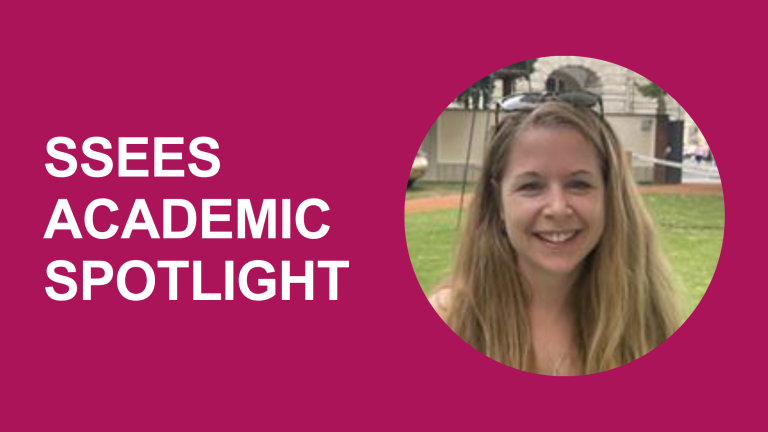Academic Spotlight: Dr Jessie Barton Hronesova
12 October 2023
In this edition of the SSEES Academic Spotlight, we hear from Dr Jessie Barton Hronesova, Lecturer in Political Sociology.

What brought to you work at SSEES?
Stars aligned – the right opportunity came up at the right time. Until recently, I was running my own research project funded by the European Commission from the US and Italy, when a position of lecturer in political sociology at SSEES came up. SSEES has always been on my radar as a place where I would feel academically at home, given my interdisciplinary nature and my focus on Central and Southeast Europe. The role seemed a perfect match. So I decided to apply although I still had more than a year of research funding. It’s full circle for me because I did my Erasmus year here at SSEES 16 years ago, which was the start of my nomadic international life that has now brought me back to London.
If you weren’t working in academia, what would be your dream job?
Probably wildlife conservationist. I spent some time in northern Kenya with my husband who was posted there. I volunteered in an animal orphanage, scrubbing monkey cages and spending time with baboons. It gave me so much joy that I seriously considered changing career. I had the best lunch buddy in a 100+ year old giant tortoise called George. I think fondly of that time, though I know that the staff were in a grim fight for the survival of some of the species. We were able to see Sudan, the last male northern white rhino, who grew up in Czechoslovakia so even understood my Czech commands! It was magical.
I should also say that I have tried many other ‘dream jobs’ but they often turned out not so dreamy. I worked in the charity sector, consulting, international organisations and at a war-crimes tribunal. They each had downsides and advantages, but in the end, I kept coming back to academia.
Can you tell us a bit about your research/teaching and why it’s important to study this?
I work primarily on memory issues and transitional justice in the former Yugoslavia and also Central Europe. I study narratives of suffering and denial, how they are interpreted in the public sphere, and what political functions they have. I have done a lot of work in Bosnia and Herzegovina on victims’ reparations and what families of victims and survivors of the 1992-5 war “want and need” to be able to cope with the past. I find it really important to focus on victims and their needs in order to “deal with the past”. In my current project, I specifically look at how portrayals of victimhood in Czechia, Hungary and Serbia are skilfully used by leading political actors to canvass and gather votes. I think unless we understand the drivers of this appeal at both the individual and collective levels, it will be hard to grapple with the contemporary exclusionary politics that plays on emotions, fears and victimizations. My teaching is informed by this research agenda as I work across several disciplines and bring my empirical research into the classroom.
Outside of work, how do you unwind?
Unwinding is hard with a small child and a full-on job, but I exercise daily. I am a former gymnast, so I need to move a lot. I am a very keen runner, and I love CrossFit. I started CrossFit in Sarajevo and never looked back. It gives me the right endorphin-boost and I learn new skills (I do decent pullups and great handstand push-ups)!
If you could recommend only one book, what would it be?
That is an impossible question! I often re-read my favourite classics like Kafka’s Castle, Milan Kundera, Hannah Arendt, Stefan Zweig and discover something new. If I had to choose only one, then it would probably be Karl Jaspers’ The Question of Guilt. That book has had a great impact on me as a scholar and person, and I often use it as my moral compass. Its message is simple yet complex, it’s nuanced yet generalisable. It’s short but can be discussed endlessly. I always try to sneak it in my classes whenever I can. I think everyone should read it.
Who has been the greatest source of inspiration to you, and how have they impacted you, personally or professionally?
There has not been one person for sure, it has been an amalgam of good teachers and strong personalities in my life. I think subconsciously I have adopted the perseverance, diligence and hard-working nature of the women in my family. I have a lot of energy and grit and that comes from there. But later on, I think it was especially a lot of inspirational pedagogues who always nudged me in a direction that proved to be helpful and that then opened another set of doors. And finally my husband, who moderates my impulsiveness but also provides a great sounding board.
Tell us something about you that might surprise people.
I have not always been Jessie. I spent most of my childhood in Prague as Lucie. Jessie as a female name has a long history in my family but it’s not a Czech name. And when I was born during ‘normalisation’, only names “on the calendar” or names with Czech spelling were allowed, which Jessie was not. So I became Lucie – the closest to Jessie my parents could think of. So after the revolution in 1989, we decided to change my name to what it was supposed to be, Jessie.
 Close
Close

